Perennial autumn flowers (blooming in autumn)
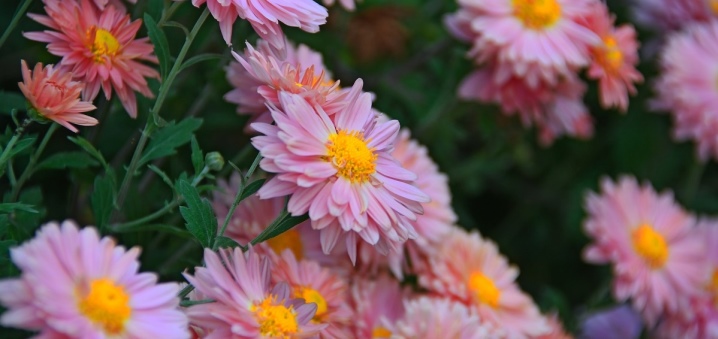
In autumn, when there is so much lack of bright summer colors and aromas in the garden, perennial autumn flowers will save the situation with their splendor. They also have spectacular colors and can transform a garden or cottage into an amazing colorful flower garden.
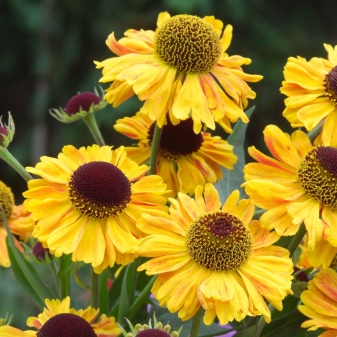
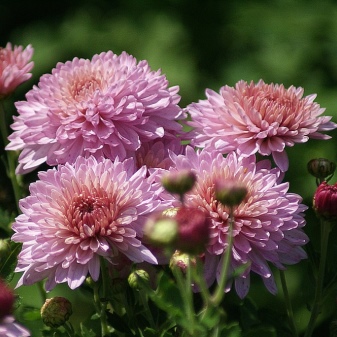
Peculiarities
Autumn flowers are unpretentious to care for and are highly resistant to diseases and different weather conditions. They have a different appearance and flowering time, but they mainly belong to perennial crops and have a bright, pleasing to the eye colors.
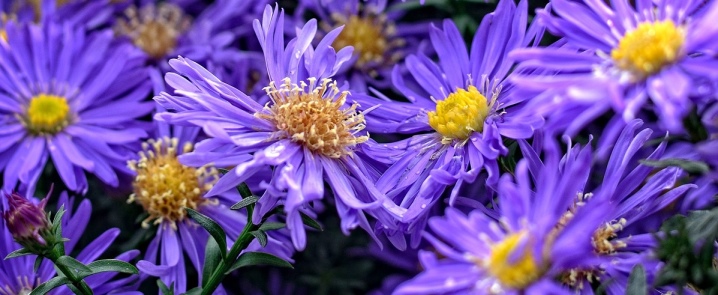
Overview of species and best varieties
For more convenience, florists separate autumn perennials by flowering time:
blooming in September;
in October;
In November.
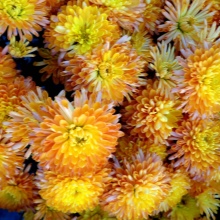
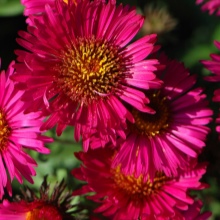
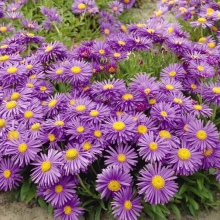
In September, summer-flowering plants are replaced by early-flowering autumn flowers, which are cold-resistant and resistant to changeable weather, unlike summer ones.
Chrysanthemums
Probably the most common and popular among autumn blooming flowers. There are quite a few varieties of this plant, they differ in height, flower parameters and their color. Varieties with large buds are not characterized by special frost resistance, although they bloom until the end of autumn, but varieties with small inflorescences overwinter well.
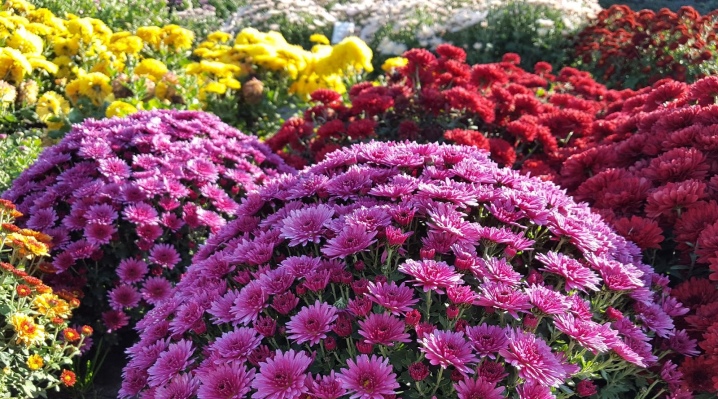
Among the varietal variety of chrysanthemums, Korean ones are most popular with flower growers due to their unpretentiousness and numerous small buds:
"Alyonushka" with simple pink flowers;

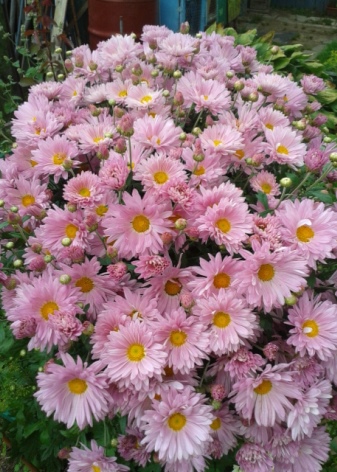
- Altgold with a rich yellow color of pompom-shaped inflorescences;
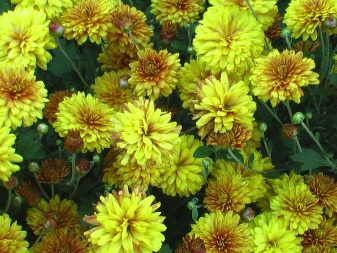
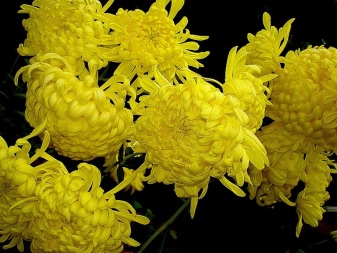
- "Snow White" with beautiful terry buds of a snow-white tone;
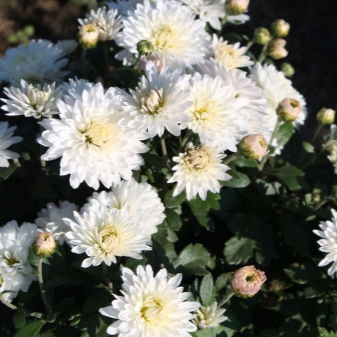
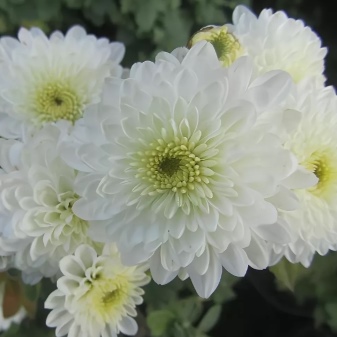
- "Hebe" possesses simple pinkish-yellow flowers, is characterized by lush flowering;
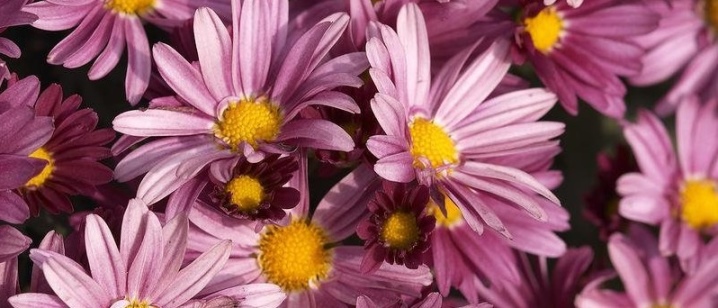
"Lada" has pinkish-lilac double buds;
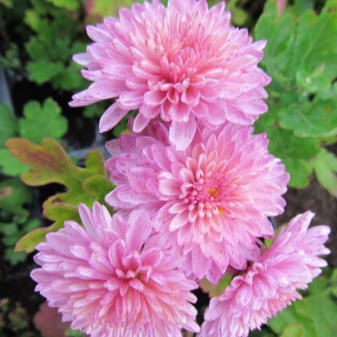
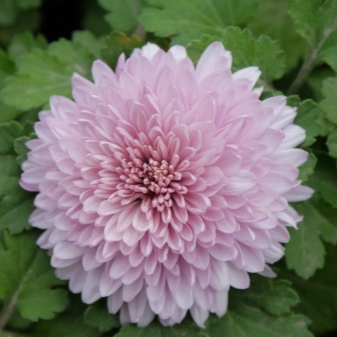
- "Summer" with large semi-double red inflorescences;

"Orange Sunset" It differs in double large flowers of an orange-brown tone.
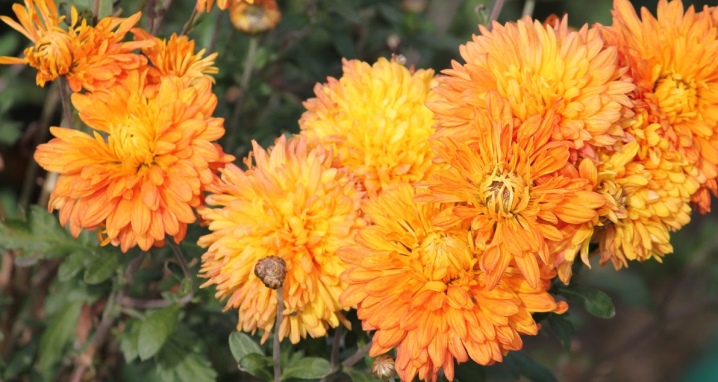
Thanks to the multitude of varieties and bright color, chrysanthemums have firmly taken their place in the TOP of autumn flowers.
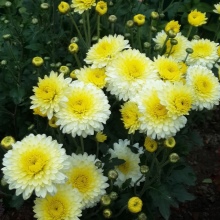
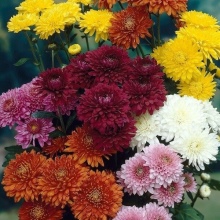
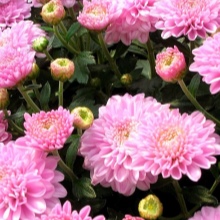
Asters
They are also extremely popular and widespread, as they are characterized by long and exuberant flowering during the first two autumn months. Asters have quite a few varieties that differ in size and color palette. Plants are attracted by resistance to mild frosts, ease of reproduction and splendor of buds. The most famous varieties:
"New English" belongs to tall bushes, can reach up to 2 m in height, the color of the buds is different (white, white-purple);
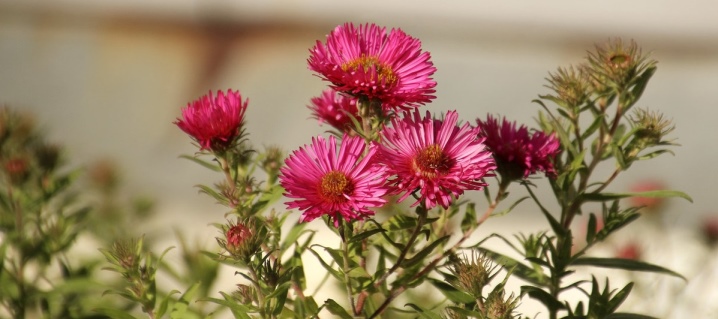
- "Novobelgiskaya" grows in the form of compact small bushes, reaching 0.5 m, the buds are of average size and the same color as the previous variety;
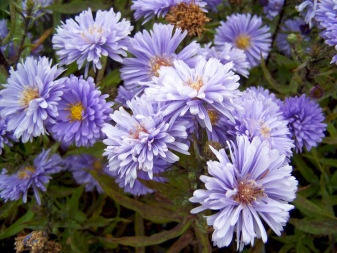
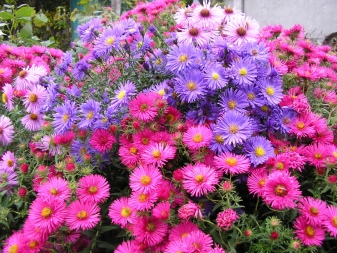
- "Alpine" - a miniature variety with a size of 10-30 cm, blooms lilac, yellow, pink or white, you need to thin out regularly, otherwise they will cover the entire area with a thick multi-colored carpet.
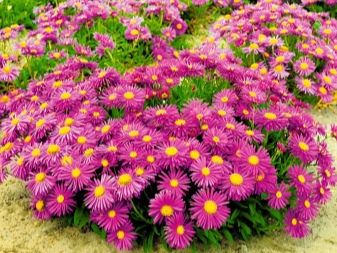
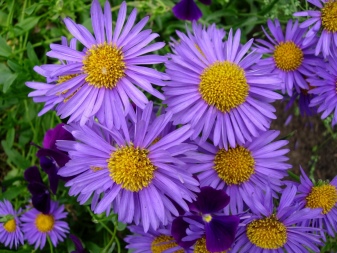
There are quite a few varieties of asters, each of them deserves a place of honor in the autumn flower garden.
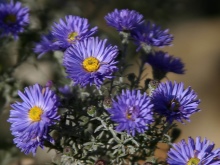
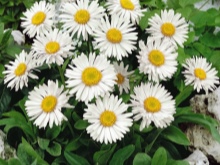
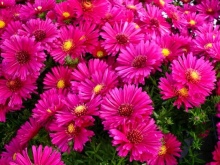
Dahlias
This flower belongs to a very numerous genus. These are mainly tall plants with voluminous leaf plates and lush inflorescences, which are of several types: peony, spherical, anemic, needle-like, collar or nymphaean. The color of the flowers is different: one-color, two-color or with several shades. Dahlias bloom until frost, then wither, as they are thermophilic plants. The most spectacular and popular perennial varieties: Everest, Grand Duke, Tropic Sun, Eternal Flame, Ankres, Rotbal.
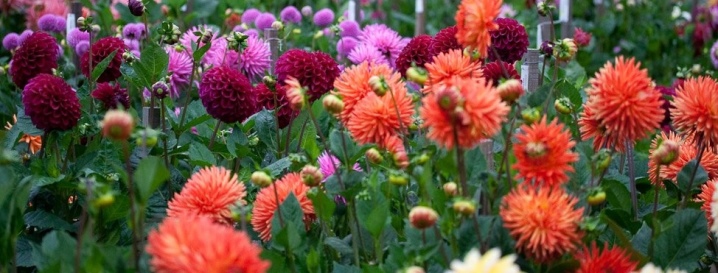
Rudbeckia
The plant is distinguished by bright yellow and orange inflorescences with a dark brown center. In appearance, the flower resembles a large chamomile. The stems of the plant reach 45–65 cm in height and have a rough surface, like the leaf plates. Keeps buds until frost. Common varieties:
"Cherry Brandy" with cherry petals and an almost black core;
"Shiny" with bright yellow flowers;
"Golden ball" with strongly dissected yellow buds;
"Purple" resembles a chamomile in appearance.
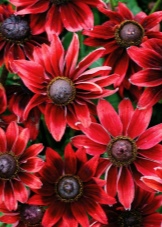
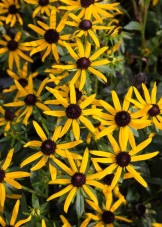
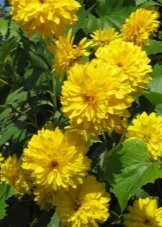
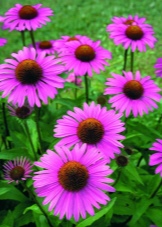
Zinnia graceful
Another name for the flower is Majorians. The shoots of the plant are erect, covered with stiff short villi, the inflorescences are simple, semi-double or double. The shape of the buds, like the color, depends on the variety. The most common:
Short staff refers to low bushes (up to 25 cm) with double buds of cherry, white, red or coral tones;
"Polar bear" differs in white double inflorescences with slightly curved petals, can reach a height of 65 cm;
variety mixture "Carousel" represented by a mix of bright and colorful buds, the height of the flowers is about 60 cm.
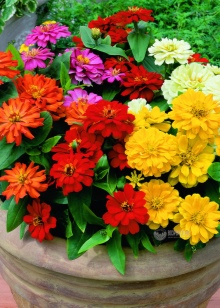
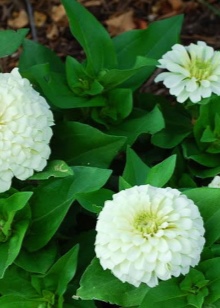
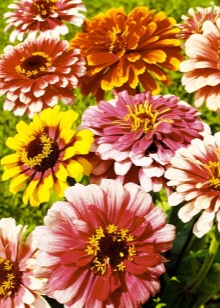
Marigolds (or black shavers)
The plant is distinguished by a multitude of species and varieties, the size of the plant is 20–120 cm in height. Simple or double inflorescences-baskets are yellow, orange or brown. Marigolds bloom until frost. This plant differs in medicinal properties. Some of the most popular and widespread varieties: Antigua, Snow White, Prima Gold, Tiger Eyes, Lemon Queen.
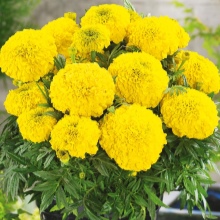
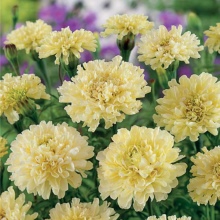
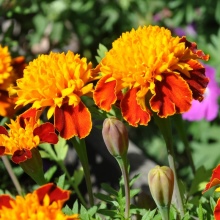
Fuchsia
The plant has flexible shoots with green leaf plates that have reddish veins. The flowers consist of a long calyx and a tubular corolla, the color is different, but bright colors prevail. Flowering is long, up to the first snow. The most spectacular varieties: Cecile, Blue Angel, Ballerina.
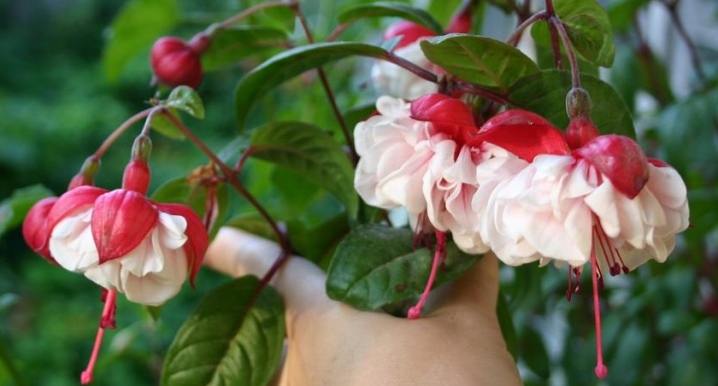
October flowers are more resistant to frost and temperature differences, they can also withstand light frosts.
Gelenium
Flower height can vary from 10 to 160 cm. Basket-type inflorescences can be orange, reddish-yellow or orange-brown. The most famous varieties of autumn helenium: "Eldorado", "Flamenrad".
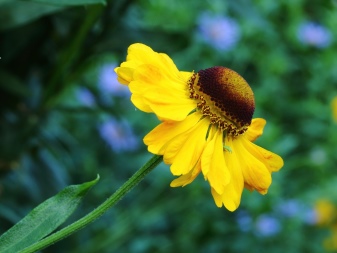
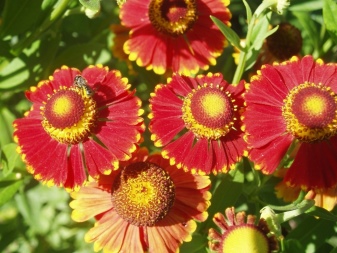
Colchicum (colchicum)
With their beautiful appearance, the buds of the plant will add a spring touch to the autumn landscape. The flower has rather large parameters and white-pink or light lilac petals, in appearance they resemble a crocus. The height of the plant is on average 20–25 cm. Depending on the species, the tone of the inflorescences, as well as the height of the bush, may differ slightly. Beautiful varieties: "Waterlily", "Autumn", "Purple".
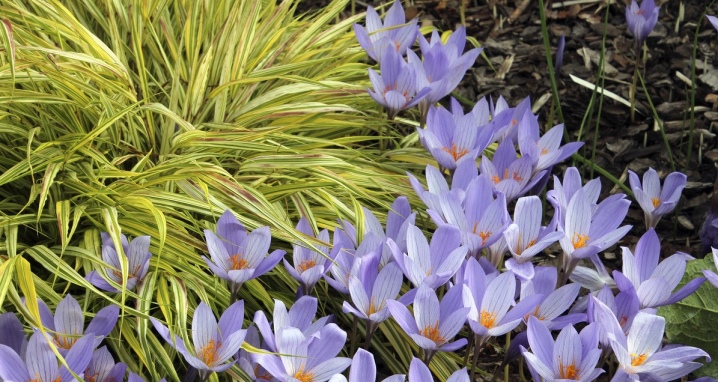
Pansies
Usually low-growing species of this plant (from 15 to 30 cm) are grown, they fit beautifully into any flower garden. The flowers are very similar in appearance to the violet, but the difference is in color. Petals can have up to five shades, but one or two contrasting spots are always located in the middle:
"Snow Maiden" with white buds;
"Little Red Riding Hood" with large bright red flowers;
"Winter sun" with a bright yellow color and dark brown spots on the lower petals;
"Evening heat" with brownish-red petals, on the lower ones there are darker spots.
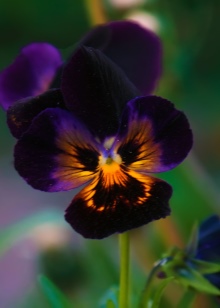
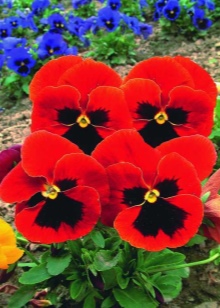
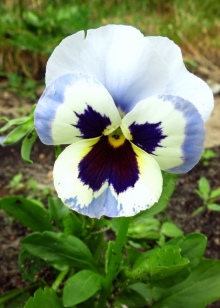
Nasturtium
The plant stands out for its bright, funnel-shaped buds, consisting of 5 petals. Their colors can be different, but the most common types are yellow or red, as well as multi-colored. Nasturtium buds give off a pleasant aroma. The brightest varieties: "Ladybug" (the only variety with peach-toned petals, with spots on them), "Bright flower bed", "Cherry rose".
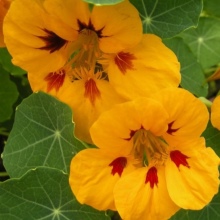
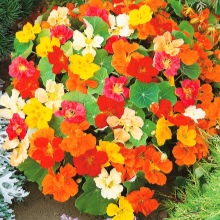
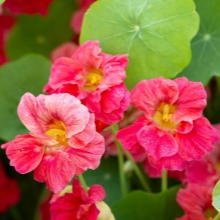
Perennials blooming in November do not stand out in numbers, but decorate the garden up to the first snowfall and are highly frost-resistant.
Petunia
The plant is distinguished by a variety of species and forms, there are both erect and ampelous, in addition, it is distinguished by different sizes of buds and a variety of colors. The buds can be white, pink, lilac, burgundy, as well as two-colored. Most beautiful varieties: Lavender Morn, Mystic Pink, Royal Magenta, Priscila.
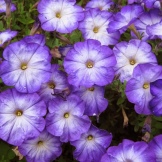
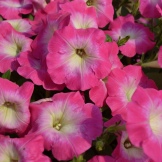
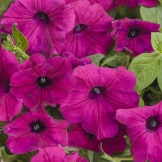
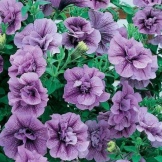
Phlox
The plant, depending on the species, has a different height. The buds are tubular or funnel-shaped, forming lush inflorescences. Phlox colors are very diverse, can be either monochromatic or with several shades. The most popular varieties:
"Anna" with white flowers;
Bornimer Nachsrmmera with a light salmon color;
"New" with white and blue petals;
"Margri" with tricolor buds.
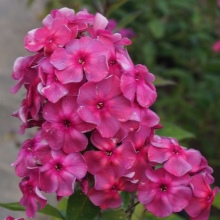
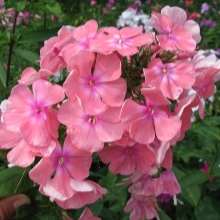
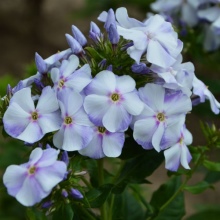
the Rose
The queen of flowers also pleases with her flowering during the cold autumn period. A large number of varieties have frost-resistant characteristics, winter well even in harsh climates and bloom at fairly low temperatures. The most resistant to cold climatic conditions are park varieties, which, in turn, are divided into English and American. Such varieties bloom even before the first snow. The color of the buds is very diverse (depending on varietal characteristics).
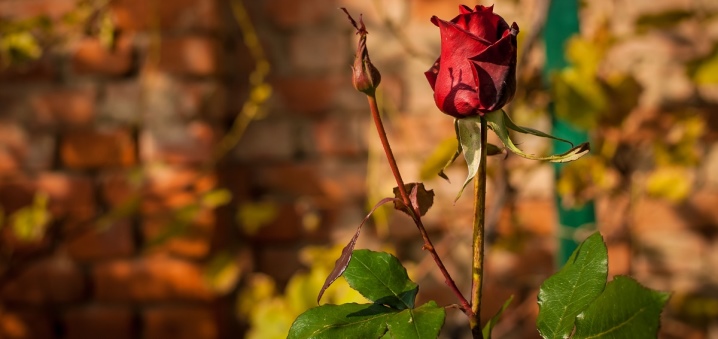
Some of the most frost-resistant varieties:
Paul's scarlet with crimson-red semi-double inflorescences, giving off a slight purple tint;
New dawn with aromatic pearl-pink buds of a classic shape;
The fairy differs in small, but numerous flowers of a pink tone;
Angela with carmine-red inflorescences with a light pink center.

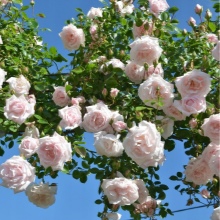
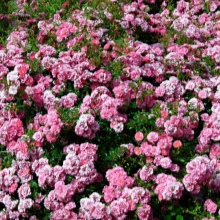
Ageratum
The plant belongs to perennial shrubs. The inflorescences have a beautiful spherical shape. Due to the arrangement of the peduncles in rows, the crown of the bush looks very dense. The varieties differ not only in color, but also in the shape of the inflorescences, the height of the shoots and the presence of the edge:
"White ball" differs in white inflorescences, may have a light blue tint;
Pink ball has a compact size and loose pink flowers;
"Cloud Nine" with a graceful blue color;
Kalinka with blood red buds.
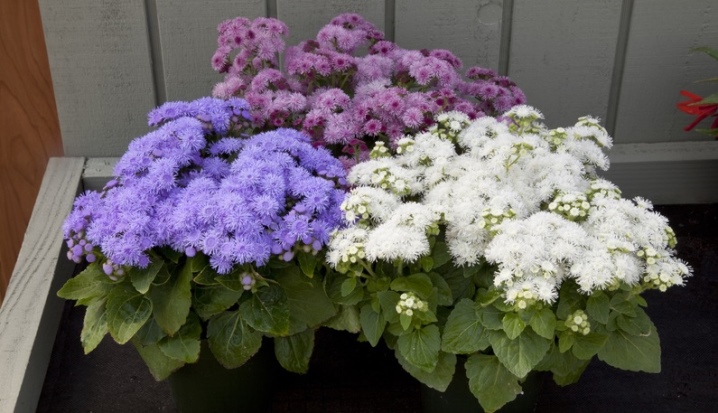
The autumn garden will also be decorated with other, no less beautiful flowers: snapdragon, verbena, panicle hydrangea, heratum, kobea, pelargonium.
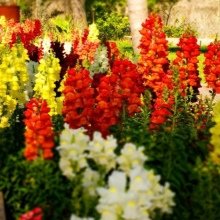
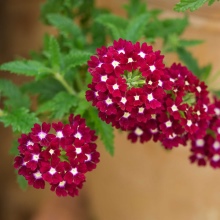
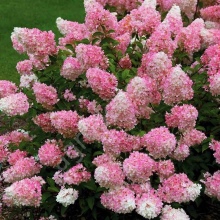
How to place in the garden?
Autumn perennials are placed in flower beds mainly in height, in which case all varieties will be clearly visible. You can plant plants according to the color palette or according to the flowering time.
But the main rule is this: when placed correctly, taller plants should not obscure the lower ones.
Therefore, low, ground cover species are planted in the foreground, behind them - a little higher, and then in the same way.
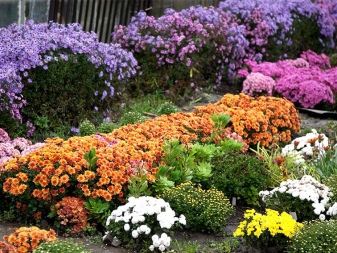
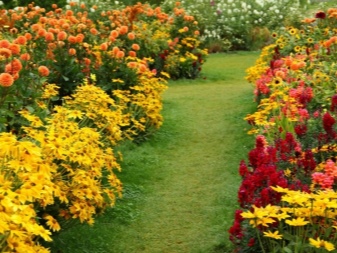
Different varieties of the same perennial can be placed in the same flower garden, since it can have both short and tall forms. In this case, tall flowers are planted in the background, and low flowers are planted in front.
When creating a composition, it is also worth alternating varieties with different color palettes so that a monotonous spot does not form.
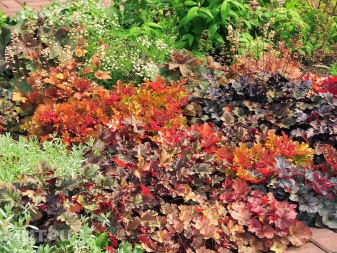
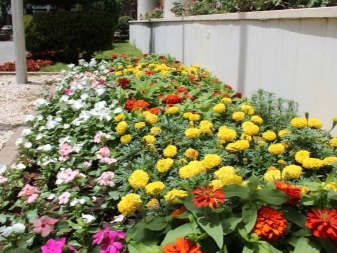
Care rules
Autumn perennials, as a rule, are undemanding to care and do not need special attention.
Loosening
For moisture and air to access the roots of the flower, the earth must be loose, so it is worth regularly treating the soil under the plants. To avoid damage, especially to undersized varieties, it is worth carrying out the procedure very carefully.
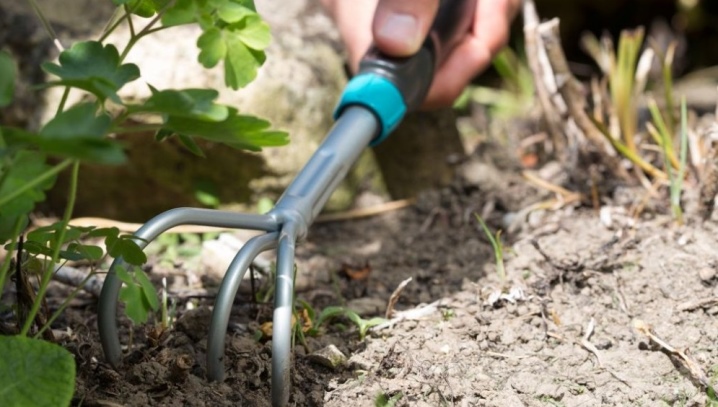
Top dressing
For the first time, the plants are fed in early spring, when the snow melts. Organics are well suited for these purposes. To build up green mass, nitrogen fertilizers are used. Mineral is fed from the beginning of budding. In the fall, they stop adding nitrogen-containing compounds and feed them with potash and phosphorus, which nourish the roots and prepare the plants for winter.
It is recommended to apply top dressing until mid-September, after which the flowers should be watered.
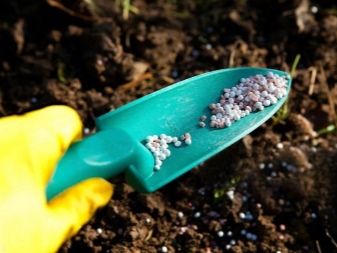
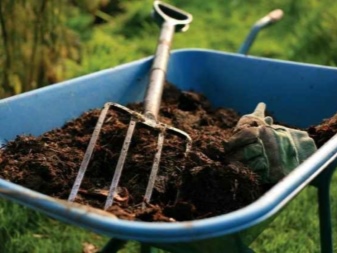
Watering
In rainy periods, the plants do not need additional moisture, the rest of the time they are quite enough once a week.
Watering should be done with warm water, it is advisable to pour water under the root so that moisture does not get on the plant.
Before wintering, it is worth moistening the flower once abundantly.
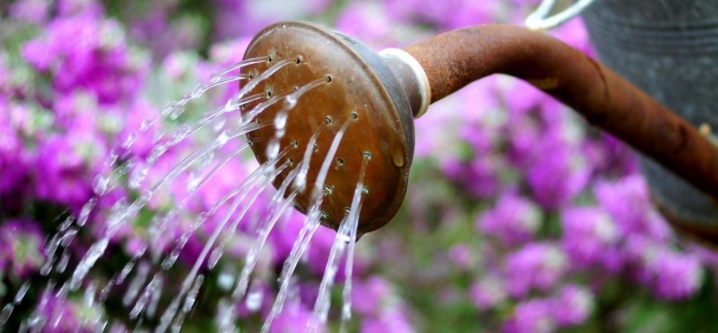
Weeding
Weed bushes while loosening. The weeding procedure is mandatory, although the weeds grow slightly in the fall, they still drown out the plants and take nutrients from the soil. It is worth doing this manually, in order to avoid damage to the flowers. To simplify the task, you can mulch the space between the plants. To do this, use dry grass, crushed bark of coniferous trees, small pebbles or expanded clay. The latter, in addition to the main tasks (preserving moisture and retaining weeds), also perform a decorative function, serving as an additional decoration for the flower bed.
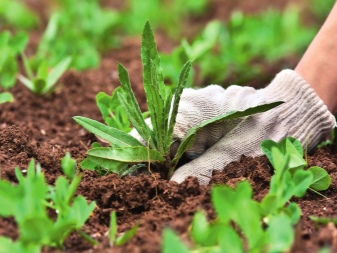
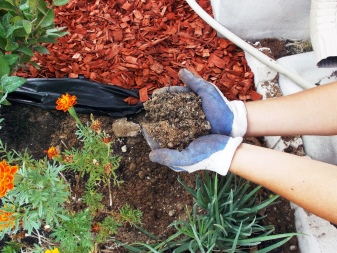
Examples in landscape design
Autumn perennials will become a real decoration of the suburban area, because they can be planted not only in open ground, but also in flowerpots.
Different types of autumn flowers are wonderfully combined with each other, creating graceful compositions.
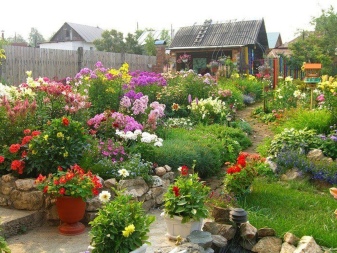
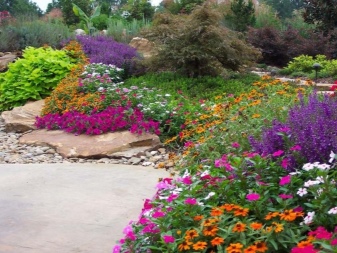
Autumn perennial flowers in high plantings look beautiful.
Low-growing autumn varieties look no less impressive in the flowerbed.
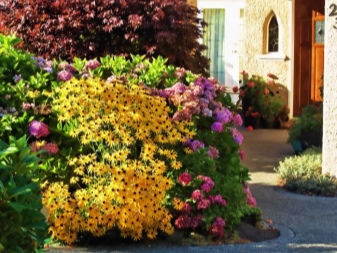
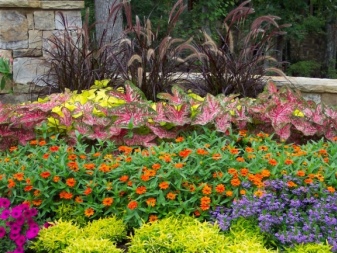
Tall flowers, in particular dahlias, are great for framing walls or fences.
Borders of autumn flowers look very beautiful.
Hanging pots will serve as a bright decoration for a garden or plot.
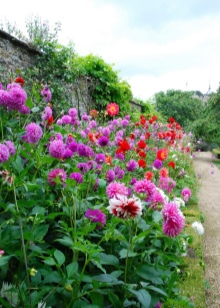
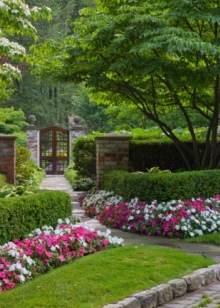
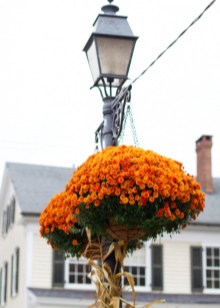
If you are still lost in the variety of types of perennial autumn flowers, then the following video will help you choose the plants that should be planted first.




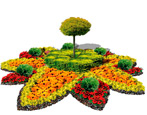
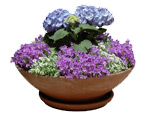
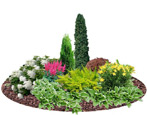
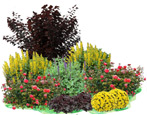
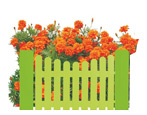
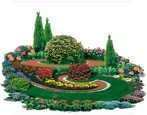
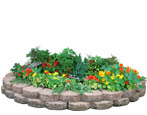
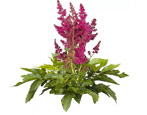
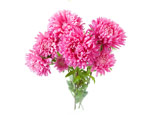
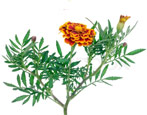
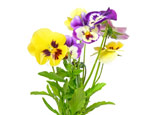
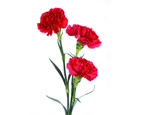
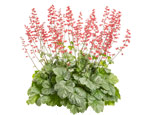
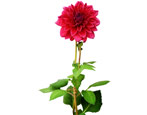
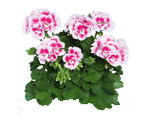
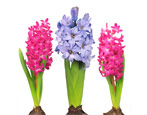
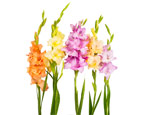
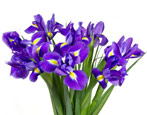
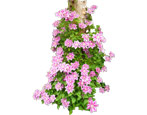
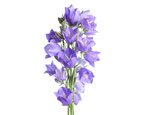
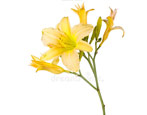
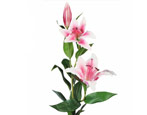
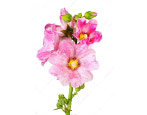
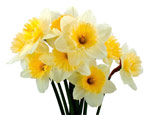
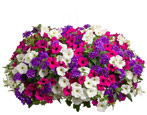
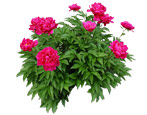
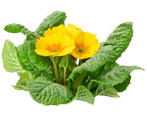
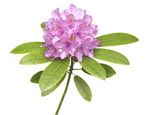
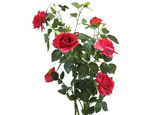
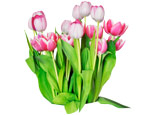
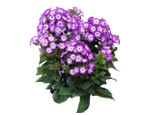
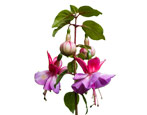
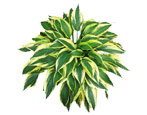
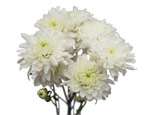
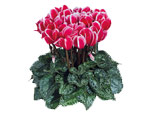
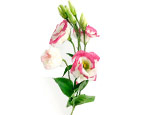































































The comment was sent successfully.